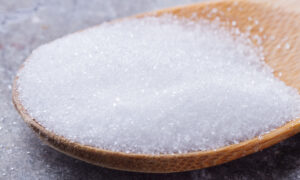Linked to Heart Attack, Stroke? Don’t Throw It Out Just Yet

The zero-calorie sweetener erythritol marked off all the boxes for the perfect sugar substitute until a recent study published in Nature Medicine claimed that the popular sweetener causes increased blood clotting and significantly elevates the risk of heart attack, stroke, and even death.
Media outlets pounced on the study results, broadcasting them loudly across the internet, stating the dangers of dietary erythritol. But key aspects of this study warrant further examination before clearing erythritol out of the kitchen cabinets.
What Is Erythritol?
Erythritol occurs naturally in fruits like grapes, pears, and watermelon, as well as fermented foods like beer, wine, and soy sauce. In addition to occurring naturally in foods, commercially produced erythritol has provided sweetness to foods and beverages since 1990.
The popularity of erythritol in the United States and worldwide is due to several benefits: it’s more easily digestible than other natural sweeteners; it’s often recommended for diabetics because it doesn’t raise blood sugar levels; and it reduces dental plaque and tooth decay.
Erythritol is also very popular among the keto diet community because it can satisfy sugar cravings without impacting blood sugar and kicking someone out of ketosis.
The Study
According to study investigators, because there currently isn’t enough information about sugar substitutes and their long-term effects, they examined erythritol and its risk for arterial disease.
The initial group studied was comprised of 1,157 patients who were undergoing cardiac testing. The investigators measured the level of artificial sweetener metabolites in their blood. Among several artificial sweetener metabolites found, their blood showed an elevated level of erythritol. The study investigators also found the study group members with the highest levels of erythritol went on to have a major adverse cardiac event, such as a heart attack or stroke.
However, they did not study their diet, so it was impossible to determine if they had eaten any food that contained erythritol.
After they found high levels of erythritol in the first group of patients having their hearts evaluated, they gathered two more groups of people to validate their findings from the first group.
They performed the same blood testing on one group of 2,149 people in the United States and another on 833 people in Europe. Notably, the average age of the first and second study groups was 63 to 75 years. Members of both groups also had a high incidence of hypertension, coronary artery disease, and a history of a heart attack.
Researchers gathered the members of the second study group from what they describe as “quaternary referral centers,” which are highly specialized hospitals known to treat the sickest patients. The investigators note these study members already had a high risk of cardiovascular disease, including Type 2 diabetes, and obesity. Again, they found high blood levels of erythritol among the study group members, and those with the highest levels, similar to the first group, also experienced a major adverse cardiac event over the following three years.
The investigators did not study the diet of this group or whether they ate any type of food containing erythritol.
Blood Clotting Examined
The study investigators believed since high levels of circulating erythritol levels among the three study groups were associated with a higher incidence of blood clots or major adverse cardiac events, they needed to explore erythritol’s impact on platelet function. Therefore, they took platelet-rich plasma from healthy people, put it in a petri dish, and injected erythritol. They found that erythritol made the platelets sticky, and they started forming clots.
To further evaluate the effect of erythritol on blood clotting, researchers injected erythritol into mice and found that when circulating erythritol levels were high, the mice experienced blood clots and carotid artery injury.
Ingesting High Levels of Erythritol
Finally, the scientists wanted to see what happened when they gave healthy individuals a large quantity of erythritol. They examined the blood of eight healthy participants after giving them a drink sweetened with 30 grams of erythritol. To compare, there are 30 grams of erythritol in about 15 packets of the erythritol sweetener Truvia. Participants’ blood erythritol levels rose 1,000-fold higher and remained elevated for two days before slowly dropping.
They did not test the participants’ blood for clot formation, and they did not follow them for longer than two days.
According to the study investigators, their findings from all aspects of the study suggest that erythritol is associated with a high risk of major adverse cardiac events (heart attack, stroke, or death) and increased blood clotting.
Analysis of Study Conclusions
A critical fact not readily discussed in the study is that eating and drinking erythritol-sweetened products isn’t the only way it enters our bloodstream. Our bodies produce erythritol through the pentose phosphate pathway (PPP). To explain it simply, the PPP helps the human body make DNA and RNA. The end products of this process are compounds that go on to fight dangerous free radicals. These compounds are better known as antioxidants. One of these compounds is erythritol. Researchers in previous studies have called erythritol a “sweet antioxidant.”
Kelly Johnson-Arbor, a medical toxicology physician and medical director at National Capital Poison Center, told The Epoch Times, “Since high blood sugar level causes an increase in oxidative stress, some researchers believe that erythritol could actually protect against oxidative stress by acting as an antioxidant and could be a good sugar substitute for diabetic individuals. The results of this study suggest erythritol is potentially harmful to diabetics and others at risk for heart disease.”
However, high circulating blood erythritol levels in study group individuals may have resulted from their chronic disease state.
Dana Hunnes, who holds a doctorate in community health sciences and is the senior dietitian at UCLA Medical Center, told The Epoch Times that she’s not a “big fan” of sugar alcohols and chemically-derived sugars. She is familiar with two research studies [1],[2] referenced in the Nature Medicine study that found that blood erythritol levels in freshman college students were associated with weight gain and that erythritol levels are associated with Type 2 diabetes. Hunnes said, “One of the main reasons I eschew sugar alcohols like erythritol is because they can demonstrate unfavorable associations with blood sugar control, levels, and weight gain.”
Johnson-Arbor and Hunnes agreed that it’s difficult to draw conclusions from this study because it doesn’t relate to real-world use, and isn’t clear whether it can be applied to the general U.S. population.
Johnson-Arbor adds, “Several factors, including dietary habits, may have played a role but were not explicitly examined, and the exact relationship between erythritol and heart/vascular disease requires more investigation.”
“I definitely think more research is needed,” said Hunnes. “But I also think the media tends to oversell certain outcomes to studies because of the shock factor.”



